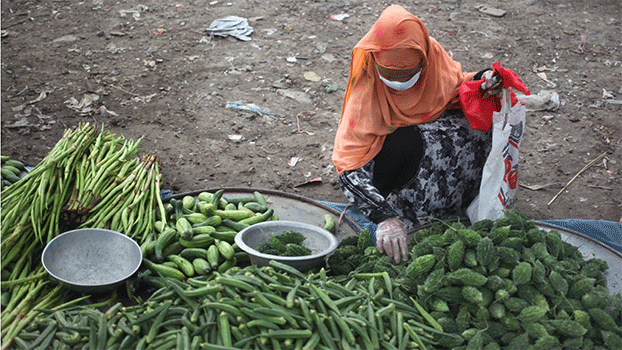
The agrarian sector in Bangladesh is facing a crisis due to COVID-19. For a lot of people, it is a matter of life and death. Though the government is making efforts to support farmers in distress, strategies like financial support will not work alone.
Vinod Koshti is a Project Manager at the South Asia office of the Rosa-Luxemburg-Stiftung in New Delhi. All comments were collected in telephone interviews conducted by Iftekhar Ali from Research Initiatives, Bangladesh (RIB) between 11 and 13 April 2020 in coordination with the author. RIB is a Rosa-Luxemburg-Stiftung partner organization.
On 26 March 1971 Bangladesh gained independence. Fifty years later, on the exact same day, the entire South Asian country was put under lockdown – or shutdown – due to the COVID-19 pandemic after the first infections with the coronavirus were detected. After the announcement, thousands of people left the capital Dhaka to go back to their home villages all across the country.
According to the World Bank, around 85 percent of Bangladesh’s population of more than 160 million people earn less than five euro per day. The shutdown is badly affecting the livelihoods of workers in the informal sector. For them, no work means no food. The government reacted to the corona crisis with a 31-point instruction plan that includes guarantees for special attention to the most disadvantaged people like agriculture workers, day labourers, beggars, street children, women abandoned by their husbands, widows, and hijra (transgender) communities.
Despite these measures, poverty in Bangladesh is 60 percent higher than before the outbreak of COVID-19. Many day labourers report that their income has been reduced to zero in the last weeks. Rural areas are particularly affected. More than 106 million people in Bangladesh live in villages, and 45 percent of the total working population is engaged in agriculture which contributes about 15 percent to the country’s GDP.
“We farmers are in a miserable situation, as there are no buyers in the local markets”, reports Porash Chandra Ray, a farmer from Nilphamari district in northwestern Bangladesh, via telephone. “Due to the restrictions, we cannot go to markets. Farmers are feeding their red amaranth to their cattle and throwing away their spinach and their eggplants.” Now is the harvesting season for rice, potatoes, onions, and maize. Due to the shutdown there is a shortage of labourers and diesel, as well as limited marketing opportunities. At the same time, the prices of other products are increasing. Farmer Younus Ali is concerned about the increasing prices of staple food: “Not only are we not getting fair prices in the local markets, but at the same time the price of other commodities like milk, salt, oil, sugar, pulses, spices, soap, or medicines have increased.” Woman farmer Ayesha Akter adds: “The rich in the villages have additional non-farm income and can also stock food and essentials, but the small and marginal farmers have very limited coping capacities.”
Bangladesh Prime Minister Sheikh Hasina announced a financial aid package over 550 million euro for farmers. The Bangladesh Dairy Farmers’ Association claimed that marginal farmers will not benefit from the financial aid package. The money will be disbursed among small and medium farmers at only five percent interest. Peasant organizations, however, are demanding interest-free loans to ensure food security for all. Moreover, given that the entire domestic supply chain has collapsed, the current crisis cannot be solved by giving loans to farmers alone. A large number of Bangladeshi farmers are small and marginal. They do not have a bank account to get a loan. These packages will thus only help the big producers.
In Bangladesh, 30 percent of children are vitamin-A-deficient and 44 percent of women are anaemic. People have taken to the streets to demand food. If the current situation continues, the situation will soon become very dire. Renowned social activist Anu Muhammad criticized the government for ignoring the rights of farmers, labourers, and workers despite the fact that they provide critical services to bring us all out of the crisis. Left parties in Bangladesh argue that food security is the responsibility of state and society—it cannot be left to private corporations. In a joint statement, an alliance of left parties demanded increased allocation in the form of assistance, not loans, to agriculture, marginal poor, and the middle peasantry. For a lot of people in Bangladesh, it is a matter of life and death: either the coronavirus or hunger. The poor masses find themselves in a tough battle for survival.
Despite all the critical things happening in Bangladesh, there is still hope. An international solidarity movement led by the environmental organisation 350.org has developed the Principles of Just Recovery to deal with this humanitarian crisis. The principles are: (1) People’s health first, no exceptions; (2) Provide economic relief directly to the people; (3) Help workers and communities, not corporate executives; (4) Create resilience for future crises; 5) Build solidarity and community across borders – do not empower authoritarians. If the government really wants to do what they claim, then these principles must be adopted to ensure a “just” recovery from the crisis. The slogan given by the Ministry of Agriculture, “Stay with farmers – stay close to farmers”, is a good starting point. But it remains to be seen whether this spirit can withstand bureaucracy and sectarian politics.